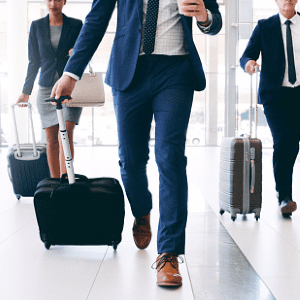 Hospitality employees’ stress levels during the COVID-19 pandemic and their later career trajectories may depend on both their experiences in the workplace and personal traits, according to Dr Wei-Jue Huang of the School of Hotel and Tourism Management (SHTM) at The Hong Kong Polytechnic University and co-authors. Hospitality work is demanding, and the pandemic and associated economic crisis may have led hospitality workers to reconsider their career trajectories. Through direct interviews with current and former employees in the U.S. hospitality industry, the researchers explored how workplace experiences during the pandemic affected these employees’ subsequent career choices.
Hospitality employees’ stress levels during the COVID-19 pandemic and their later career trajectories may depend on both their experiences in the workplace and personal traits, according to Dr Wei-Jue Huang of the School of Hotel and Tourism Management (SHTM) at The Hong Kong Polytechnic University and co-authors. Hospitality work is demanding, and the pandemic and associated economic crisis may have led hospitality workers to reconsider their career trajectories. Through direct interviews with current and former employees in the U.S. hospitality industry, the researchers explored how workplace experiences during the pandemic affected these employees’ subsequent career choices.
Since early 2020, the COVID-19 pandemic has upended industries worldwide. However, few have been hit harder than hospitality and tourism. Globally, more than 60 million jobs in this industry were lost in 2020 alone. The spread of COVID-19 and related social distancing practices posed fundamental challenges to the hospitality and tourism industry. “Although the pandemic’s impact on the hospitality workforce may seem similar to previous global crises and depressions”, say the researchers, “COVID-19 is different, as it impacts hospitality and tourism directly”.
In addition to hindering the warm interpersonal exchanges that are characteristic of hospitality settings, the pandemic led to “travel shaming”, a form of social pressure that deterred potential travellers wishing to escape pandemic restrictions. Such pressure, along with tourists’ concerns about their own health, further reduced demand for hospitality services.
These challenges struck directly at the heart of the industry. “Considering future prospects”, the authors note, “employees became more acutely aware of the vulnerability of the industry and developed ‘backup plans’ outside the industry”. This led to “multiple talent crises”. One such crisis that has received considerable attention in the press is the “Great Resignation”, a trend of voluntary employee resignation in response to increased stress levels and untenable working conditions.
Given the excess demands placed on hospitality workers, this employment trend has led to substantial concerns that employees might pursue careers in new fields. Alternatively, however, situations such as the pandemic may present a “unique opportunity to bolster employer–employee relationships”, say the researchers. Accordingly, they explored the circumstances affecting U.S. hospitality workers and their decisions to remain in, leave, or return to the industry after the pandemic.
“Hospitality employees”, according to the researchers, “are the backbone of the business and first-hand witnesses to the detrimental effects of the pandemic on the industry”. The COVID-19 pandemic has greatly increased hospitality employees’ stress levels, leading to negative consequences such as burnout and substance abuse. Employees under stress even may choose to leave their employers or the industry altogether.
During the pandemic, industry employees faced challenges such as layoffs and furlough arrangements, as well as wage decreases, which affected both their livelihood and mental health. The researchers thus consider it essential to understand hospitality employees’ lived experiences during the pandemic, observing that “individuals experience the situation differently based on where they are and how their daily life, work, family, health practices, etc. have changed”.
They explored how employees coped with stress and other difficulties, aiming to understand “how those experiences shaped their ultimate decisions” regarding their hospitality careers. Their exploration was based on the transactional model of stress and coping, which states that a person’s interactions with their environment affect their ability to cope with and adapt to challenges, and career construction theory, which explains “how individuals develop their professions by aligning their self and social identity with their work”.
In particular, the researchers studied “career adaptability”, a key component of the career construction theory previously shown to have a positive effect on employees’ capacity to work beyond their formal job descriptions. Such adaptability, however, can be a “double-edged sword”; although it can promote employees’ resilience in a supportive workplace, it can also increase their “turnover intention”, or intent to pursue other employment, in a workplace that is hostile or uncertain.
The researchers interviewed 31 adults who had worked in the US hospitality industry during the COVID-19 pandemic. Initially, the participants were recruited through the researchers’ networks. These earliest participants were then asked to recommend other potential participants (i.e., snowball sampling). Nearly 30% of the participants had remained employed at the time of the interviews. The others had been laid off or furloughed.
The researchers describe their study as “phenomenological research”, a popular approach in tourism research that “sees the participants as ‘experts’, allows their voices to be heard, and gives credibility to their accounts within studies”. This approach allowed the researchers to learn directly from hospitality employees about how they had adapted during the pandemic. The interview questions thus were designed to gain information about the participants’ backgrounds, experiences in the industry before and during the pandemic, ways of coping with stress, and future career plans.
During the interviews, the participants spoke candidly about their stresses and coping strategies during the pandemic. Those who remained in the workplace faced new responsibilities and work formats (e.g., remote work) and increased workloads and expectations. Those who were laid off or furloughed faced financial challenges. Both groups of participants expressed concerns about the risks to their own health and that of their loved ones.
To cope with these stresses, those facing financial difficulties applied new budgeting strategies, relied on unemployment benefits, or even took other jobs. For those seeking new opportunities, “relationship-building and networking appeared to be popular strategies”. Some participants took the opportunity to rest and “engaged in various recreation and leisure activities to help themselves feel better”. The researchers suggest that employers “consider promoting various employee-assistance programmes that cover aspects such as mental health consultancy and leisure/recreation activities”.
The participants had experienced a great deal of uncertainty due to the quickly changing pandemic situation. However, the researchers observe that “transparent communication is the key to maintaining a positive employer–employee relationship”. Participants whose employers were candid about their decisions to lay off employees viewed their employers positively. Those whose employers were not transparent tended to negatively view their employers and, in some cases, the industry, leading them to seek employment elsewhere. These findings suggest that in a crisis, employers can do much to alleviate their employees’ uncertainty and anxiety by simply being transparent and communicating openly.
Other factors also influenced the participants’ attitudes and decisions regarding their careers. Those “who remain[ed] employed appeared to be well adapted to the circumstances” and were passionate about their work and optimistic about the industry’s future. Among those who were laid off and furloughed, “positive working experiences, including a healthy working environment and a strong bond with the team, as well as a sense of empathy towards the employer”, influenced the participants’ decisions to remain in the hospitality industry. Employers are advised to provide a supportive workplace and to foster team-building and professional investment among their employees.
Although this study focused on experiences in the U.S. hospitality industry during a global pandemic, the researchers note that the participants’ concerns were “comparable to those of other major career crises”. The finding that support and transparency from employers can both reduce employees’ stress and help to retain them in the industry may be applicable to other crises and to the global hospitality industry. “To create a sustainable, resilient, and engaged workforce”, conclude the researchers, “hospitality practitioners must commit to crafting positive relationships with their employees both in regular and crisis times”. Employers are encouraged to maintain open channels of communication, support employees’ development and provide stress relief.
About the authors
Liu-Lastres, Bingjie, Huang, Wei-Jue, and Bao, Huilin (2023). Exploring Hospitality Workers’ Career Choices in the Wake of COVID-19: Insights from a Phenomenological Inquiry. International Journal of Hospitality Management, Vol. 111, 103485.



















